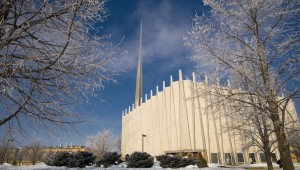
I’ve often questioned the so-called “Five Pillars of Gustavus” and their applicability to student life. Justice, Community, Service, Excellence and Faith; I see the first four, but it’s the last I feel is lacking. There’s the Community Service Center, social justice theatre and Building Bridges, the continual strive for academic excellence, the notion of a tight-knit college community, but where is Faith on our modern college campus?
Gustavus is a Lutheran school, but the extent to which I see faith as an active topic of discussion is limited. Our student reality seems to be based on the here and now, asking ourselves what we can get done, what groups we can join, how involved we can be. Gustavus boasts on its website over 100 student organizations, not to mention the draws to on-campus events like student recitals, movie showings, athletic games, an endless supply of Frost-Your-Owns and let’s not forget academics.
Chaplain Rachel Larson recognizes the same pressure on students: “Part of the culture here is to be over involved. It’s hard to resist, but at the same time we’re left with a thin experience of everything.” Our concept of faith or spirituality seems to be challenged by the need to make our earthly lives count, and the bombardment of opportunities found on college campuses—especially liberal arts schools like Gustavus—often backfires into students feeling overwhelmed, thinking they need to respond and react to everything.
Junior Management Major Rebecca Rasp, a routine chapel-goer, poses an important question relating to this issue: “You can ask someone about their academic life, their community life, their service life, but what happens when you ask a student about their faith life?”
I feel it’s a fundamental question for Gustavus—the extent to which Faith as a “pillar” reflects true student life. There is haziness surrounding “the conviction that religious faith enriches and completes learning, that it is the bedrock of community, ethics and service and compels one to excellence in a divinely ordered world—informs our whole enterprise,” as so described in our Mission Statement. Is it just a façade?
Although I agree with Chaplain Brian Johnson, who believes faith is not necessarily defined by one’s attendance in the Daily Chapel services, I do feel it can be the most direct access to that journey of faith that is encouraged in the Mission Statement, even if it isn’t necessarily a Christian faith journey.
The Gustavus website, with a new section titled “Faith and Learning,” advertises to prospective and current students alike that “those who come [to Chapel] find a place of rest and challenge, of beauty and depth, of ecumenical and inter-faith conversation and of hope.” I wonder, then, if the Chapel is open to such inter-faith dialogue, why aren’t more students challenging themselves? Or resting themselves? Was it the format of worship? The hymns? The homily? Or was it indeed just another one of the tasks they needed to complete for the day, a routine, yet another moment of immediacy over the long-lasting?
For some the problem is the physicality of sitting through a 20-minute church service when they could be doing something else. It is no surprising fact that the Chapel Break is prime time for eating breakfast in the Marketplace, getting a coffee from the Courtyard Café, or completing an assignment that just didn’t get done the night before. Taking advantage of the Chapel Break rarely means actually going to Chapel.
I’d like to think, though, that there might be something a little more meaningful we all could do in that allotted half-hour in our schedules. Yet there seems to be a contradiction between the College telling us to be involved and at the same time taking time for ourselves. There are scholarships and recognitions for students who excel at academics, service, justice and community; I don’t see any for individuals pursuing spirituality and reflection. Chaplain Rachel comments that it appears as though “taking Sabbath time is not encouraged, a time for rest, renewal and nourishment of the whole self.” And this is what frightens me not only about college life, but also life outside of Gustavus.
I realize that I cannot make people come to faith. I realize faith might not be important to people. I realize it is a journey unique to each person. But what is important to point out is that this development of one’s faith need not solely be based in the Chapel, and I want students to realize the incredible resources and opportunities for experience we have at Gustavus that aid in this journey.
But if it isn’t faith we’re looking for, I feel we at least need to free ourselves from the belief that we must always be doing something, always responding or reacting. We need to take a time of Sabbath to bring us back as people of the world and not just people of a college. What we do does not determine who we are, but rather who we are helps us figure out what we should do.
So let’s ask ourselves Gusties, where’s our Faith?
Thanks for a great article!